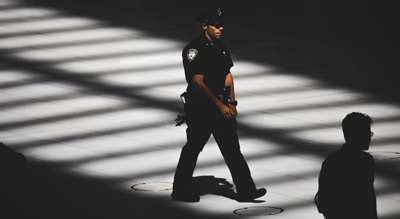The family of Stephon Clark, a 22-year-old unarmed black man who was shot by Sacramento police, has filed a lawsuit in federal court, denouncing his death as yet one more police-perpetrated murder. The officers were responding to complaints about a car prowler when they fired 20 shots in fewer than five seconds at Clark. Eight bullets struck him, primarily in the back, raising tremendous doubt about the officers’ claims that he was a threat.
The autopsy indicates that Clark lived for three to ten minutes after being shot, which brings up additional concerns about the six minutes it took for him to receive medical treatment. While the case is a horrific but not surprising example of police shooting first and asking questions later— or more accurately, creating narratives later, it is far from guaranteed that the family will receive any kind of recompense from the officers who killed him.
Police have what is known as qualified immunity, which means it is very difficult to win lawsuits against them. The idea of qualified immunity makes a certain sense, as it intended to ensure that police do not have to worry about frivolous lawsuits, but in the last several decades the Supreme Court has expanded its protections so dramatically it is, as Justice Sonia Sotomayor has said, a license to kill and an “absolute shield for law enforcement officers.”
Just this week the Supreme Court ruled on another qualified immunity case, reversing a lower court’s denial of immunity in a case in which an officer shot a woman four times who was not posing a threat to anyone in her yard. Despite her unthreatening behavior toward the officers and her roommate, Sharon Chadwick, who was there, and the account from another officer on site who said he was still trying to use verbal commands to get Hughes to drop the knife, the Court relied on its usual logic to say that no lawsuit could continue. At least in this case Hughes survived, but that Officer Kisela acted rashly in shooting her seems quite clear.
The Civil Rights Act of 1871, 42 U.S.C. §1983 is a judicial remedy to individuals who suffer deprivations of their constitutional rights. An exception is qualified immunity, which shields state and local law officers from personal financial liability if they acted in an objectively reasonable manner and did not violate clearly established federal law. In an odd piece of what seems little more than literary wrangling, the Court has determined that officers can act unconstitutionally but not violate established constitutional rights, as it is on plaintiff’s to show those “clearly established” rights through, guess what? Previous court decisions. If the Court is unwilling to ever rule that constitutional rights are violated in these excessive force cases, then no one can ever document those decisions to build a case. The Court has not ruled in favor of the plaintiff in more than a decade, despite hearing more than 18 cases related to qualified immunity. More than one-third of the cases resulted in summary reversals, meaning the Court did not even hold a briefing or conduct oral arguments.
The Supreme Court has used qualified immunity to deny damages to an eighth-grade girl who was strip-searched by school officials who thought she had a rogue ibuprofen pill. It denied damages to a man who was held in a maximum-security prison for 16 days and on supervised release for 14 months, without cause for arrest or intent to use him as a material witness. In another case qualified immunity protected officers who engaged in a clearly unconstitutional no-knock home raid. In all these cases, the court stressed that, while the Constitution had indeed been violated, the government officer could not be held liable.
Ending police abuse is going to take continued vigilance and a multi-faceted approach. But one important way to hold police accountable is for citizens to be able to bring and win civil suits. Today, the playing field for doing so is so deeply tilted toward protecting police that there is no semblance of accountability in the legal realm. Congress can and should remove the “clearly established” interpretation of qualified immunity, at a minimum. Police officers cannot continue to be given free rein to harass, assault, wound and kill simply because others before them have gotten away with it.
Laura Finley, Ph.D., teaches in the Barry University Department of Sociology & Criminology and is syndicated by PeaceVoice.
